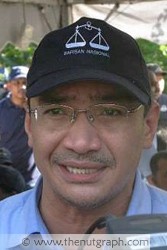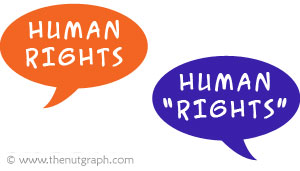IT was troubling to read Home Minister Datuk Seri Hishammuddin Hussein’s reasons for the release of eight immigration officers detained without trial under the Internal Security Act (ISA). Hishammuddin said he decided to release the eight, detained “in connection” with human trafficking activities, because they showed “remorse” over their mistakes. He also considered their wishes to be with their families during Ramadan and the fact that they had “promised never to do it again in the future”.

Hishammuddin had said earlier that the eight were detained to “protect the nation’s safety and stability”. Correct me if I’m wrong, but I’ve heard of few justice systems where those who supposedly jeopardise national security are released because they said “sorry” and wanted to go home to their families. I mean, even petty thieves don’t get released just by promising not to do it again, do they? Which leaves me wondering — what crimes did the eight supposedly commit in the first place? And if they were such a danger to national security, why weren’t they charged in court instead of being detained at the home minister’s discretion under the ISA for nine months?
All this just highlights, once again, the arbitrariness of Malaysia’s laws — where the home minister has wide and sweeping powers to detain or release “suspects”, solely upon his or her judgment. It also highlights our government’s poor commitment to upholding human rights, no matter what our leaders may tell their counterparts overseas.
Rights, not luxuries

Comments like Hishammuddin’s also make me question whether our government views human rights as rights, rather than luxuries. Viewing them as rights means acknowledging that every human being needs these rights upheld to survive and to live a dignified existence. Viewing them as luxuries means that they are optional, to be dished out when it suits the government’s fancy or perhaps when politically expedient.
Take Hishammuddin’s statements when signing the recent refugee swap deal with Australia, where Malaysia agreed to accept 800 unprocessed asylum seekers from Australia in return for Australia accepting 4,000 confirmed refugees from Malaysia. The deal came under tremendous criticism from local and international organisations as Malaysia is not a party to the United Nations (UN) refugee convention. Therefore, we do not officially recognise the legal status of refugees present in this country.
When queried on Malaysia’s non-ratification of the convention, Hishammuddin reportedly said this: “Malaysia is not signatory to the UN refugee convention because it cannot afford to give access to education, work, shelter and food to the refugees.” Hishammuddin however gave assurances that the 800 asylum seekers from Australia would have access to jobs, education and healthcare.
What our home minister is saying is, in effect: The Malaysian government would like the option of continuing to deny refugees within our shores a right to basic needs but from time to time, we may choose to provide some of them with some of these needs.
Choices

It appears that our government likes having choices when it comes to whether or not it should uphold human rights.
For example, it has certainly demonstrated its commitment to imposing its choice on the human right to assemble peacefully. The government has refused to repeal the requirement under the Police Act for gatherings of more than three to obtain police permits, a long-standing recommendation by the Malaysian Human Rights Commission (Suhakam) and civil society groups.
Our government also seems to relish having a choice over what people may print and read by retaining and consistently using the Printing Presses and Publications Act. The Act requires all print media to obtain an annual license to operate legally. Recently, it exercised this choice by blacking out parts of an article in The Economist referring to the Bersih 2.0 rally.
It also retains its choice over whether or not people may associate freely by maintaining the Societies Act, which allows the Registrar of Societies to declare organisations illegal, as they have done to Bersih 2.0.
And it has also maintained its choice over whether people have access to a fair trial upon arrest, with the continued existence and use of laws such as the ISA and the Emergency Ordinance (Public Order and Prevention of Crime).
Too many choices
These are choices that no government should have. Governments should not have a choice about whether people can be locked up indefinitely without trial, can express themselves peaceably, have access to basic needs or print or read a newspaper.
Would governments want these choices? Sure, which government wouldn’t want more power, if given the chance? Which government would voluntarily tie its own hands by repealing laws that grant it more choices and require less commitment to human rights?

A new government, perhaps — anxious to please its electorate and prove its ability to govern, such as the Selangor government’s action in passing the Freedom of Information Enactment Bill in April 2011. Or a government headed by a new prime minister, anxious to shore up public support. For example, when Prime Minister Datuk Seri Najib Razak assumed office in April 2009, he said the ISA would be reviewed (although this has yet to be done).
Or a government held in check by an independent judiciary which respects human rights. How this would work was recently displayed in a High Court judgment which held that the government’s withdrawal of an employment offer on the basis of pregnancy violated Article 8(2) of the Federal Constitution which prohibits gender discrimination.
Less choice
But Malaysians shouldn’t have to depend on the largesse of a new government or hope and pray for a “progressive” judge when it comes to exercising our fundamental rights. It is time our laws were amended or repealed to restrict our government’s choices when it comes to human rights. It would also be helpful if our courts exercised greater boldness and independence in upholding fundamental liberties and striking down unconstitutional laws and actions by government authorities.
For that to happen, there will need to be pressure from the people — to basically give whatever party in power no choice but to limit its own powers or face defeat at the next general election. So at the end of the day, it’s all about choices — including yours and mine. ![]()
Ding Jo-Ann is struck by something peculiar. One of the detained immigration officers actually thanked the government for using the ISA against him. Meanwhile, another extolled the virtues of the “rehabilitation programme” while sobbing during a Home Ministry press conference at the Kamunting detention centre.


lee wee tak says
Yeah right, so just make Anwar an offer he can’t refuse – let him apologise for the […] sodomy II case and the DPP will drop the case
Or, ask the MACC to tell us what really happened that day, and apologise with crocodile tears […], and the government will drop any legal accountability required under the present laws and legislation.
or, ask Lim Liong Sik to say sorry for the RM25 psf so we can just drop the legal proceeding and [live] happyily ever after.
andre says
There has been speculation, which is not without reasons, by many people, that if the eight are allowed to go to trial, a lot of secrets will be exposed! Of course the current flavour of the month, the [allegations of] electoral fraud of awarding foreigners instant ICs comes to mind. This is so plausible especially with what has been brought to light by the Sabah Project M experience. In short, an eight months holiday compared to a possible 10 years jail for treason sounds like a pre-agreed done deal and maybe with pension thrown [in] and on top of it, no conviction [on] your records. […]
Balwant Singh Sidhu says
It is indeed troubling when persons who have been detained without trial then admit to certain offences and are then freed at the discretion of a minister. The public have a right to know what they have done.there should be no cover up or sweeping things under the carpet. Their plea of guilt and remorse are only mitigating factors which only a court of law should be allowed to take into account when determining sentence, when they are charged in court. Just because they were detained under the ISA and then sacked does not mean that justice has been done. The detention and sacking are again factors to be taken into account in sentencing. So the question remains – WHY HAVE THEY NOT BEEN CHARGED. .?